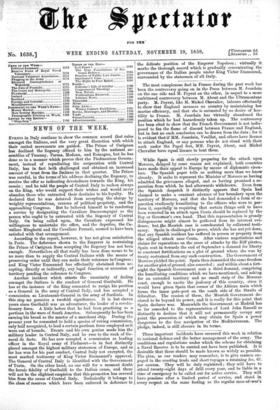NEWS OF THE WEEK.
EVENTS in Italy continue to show the common accord that rules amongst the Italians, and the very great discretion with which their united movements are guided. The Prince of Carignan has declined the Regency offered to him by the national as- semblies of Tuscany, Parma, Modena, and Romagna, but he has done so in a manner which proves that the Piedmontese Govern- ment, instead of repudiating the cooperation with Central Italy, has in fact both challenged and obtained an increased amount of trust from. the Italians in that quarter. The Prince was careful, in the terms of his address declininc. the Regency, to receive the offer as indicating devotedness towards the King, his cousin ; and he told the people of Central Italy to reckon always on the King, who would support their wishes and would never abandon those who entrusted their destinies to his loyalty. He declared that he was deterred from accepting the charge by weighty representations, reasons of political propriety, and the approaching Congress. But he believed himself to be rendering a service by designating the Cavaliere Buoncompagni as the person who ought to be entrusted with the Regency of Central Italy. On being called upon, the Cavaliere expressed his willingness to undertake the office, and the deputies, the Ca- valiere Minghetti and the Cavaliere Pernzzi, seemed to have been satisfied with that arrangement.
According to the report, however, it has not given satisfaction in Paris. The deference shown to the Emperor in restraining the Prince of Carignan from accepting the Regency has not been enough. Nevertheless all that really has been done seems to be no more than to supply the Central Italians with the means of preserving order until they can make their reference to Congress ; and King Victor Emmanuel has effectually abstained from ac- cepting, directly or indirectly, any legal function or accession of territory pending the reference to Congress.
Another incident which attests the unanimity of feeling amongst the Italians is the conduct of General Garibaldi. He has at the instance of the King consented to resign his position as a General in the army of Central Italy, and has accepted a commission as Lieutenant-General in the army. of Sardinia. In this step we perceive a twofold significance. It is but eleven years since Garibaldi was an adventurer, the leader of a revolu- tionary force. A little before that he had been practising as a partisan in the wars of South America. Subsequently he has been earning his bread as the master of a merchant ship. During the present year he consented to hold a species of roving commission, only half recognized, to lead a certain partisan force employed as it were out of bounds. Events and his own genius made him the military leader in Central Italy, and he rose to the rank of Ge- neral de facto. He has now accepted a commission as leading officer in the Royal army of Piedmont—is in fact distinctly placed amongst the highest military statesmen of Europe, and so far has won for his past conduct, Central Italy not excepted, the most marked testimony of King Victor Emmanuel's approval. The General of Central Italy is identified with the Government of Turin. On the other hand, no one will for a moment doubt the heroic fidelity of Garibaldi to the Italian cause, and there will not be the slightest suspicion that this promotion has severed him from the cause of Central Italy. Technically it belongs to the class of reserves which have been enforced in deference to
the delicate position of the Emperor Napoleon ; virtually it marks the thorough accord which is gradually concentrating the governance of the Italian people under King Victor Emmanuel, surrounded by the statesmen of all Italy.


























